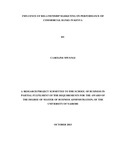| dc.description.abstract | The general objective of this study was to investigate the influence of relationship
marketing on performance of commercial banks in Kenya. The study used a descriptive
survey design which involves identifying the characteristics of an observed
phenomenon or exploring possible correlations among two or more phenomena. The
target population of this study was all the 43 banks in Kenya. The respondents (unit of
analysis) were all the 43 heads of customer relationship management. Through
purposive sampling the study reached 43 respondents in the commercial bank
headquarters in Nairobi. The method of data collection was through questionnaires as
the main data collection instrument. These was administered through drop and pick
method to the respondents. The collected data was sorted according to different
categories. Before processing the responses, the completed questionnaires were edited
for completeness and consistency. The raw data from questionnaires was checked for
completeness, errors, and coded for analysis using Statistical Package for Social
Sciences (SPSS). Qualitative data was analyzed by use of content analysis. This study
concludes that relationship managers and other staff in related departments understand
that marketing as a form of marketing developed from direct response marketing
campaigns which emphasizes customer retention and satisfaction, rather than a
dominant focus on sales transactions. The study also concludes that relationship
marketing is about winning the customer at every sales encounter and that there are
various marketing practices adopted by the commercial banks sampled some of which
are; that the management conducts regular polls and surveys of customer database to
ensure they understand the currents challenges and needs of our market, that the bank
strives to integrate customer feedback as much as possible in order to improve products
and services. To a great extent, RM has enhanced customer satisfaction, repeat
purchase, more customer referrals, shareholder value, and customer retention, an
indication that retention marketing practices adopted had a positive impact towards
brand trust, customer satisfaction, repeat purchase, more customer referrals, shareholder
value, customer retention and customer loyalty, hence their overall performance. This
study recommends that the management should come up with RM programs to ensure
that employees are well trained on the extent of importance of RM practices adoption
towards the performance of a commercial bank. Commercial banks should also
continue adopting more and more and more modern RM practices or related activities
for these have a great impact on customer satisfaction, brand trust, customer loyalty,
customer Interaction and customer retention. | en_US |

